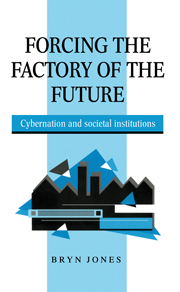Appendix: sources and methods
Published online by Cambridge University Press: 06 July 2010
Summary
Case studies of NC/CNC users
The primary data used in this book come from four main sources: case study interviewing in British and US firms using NC and CNC technology; case studies of US firms using FMS; interviews with managers, workers, trade union representatives and relevant experts in Japan; case studies, interviewing, documentary analysis and observation in, and of, Italian artisanal and FMS-user firms; involvement in the supervision and data collection for Ph.D projects on British manufacturing automation.
Some of the NC/CNC evidence dates back to the years 1978–81. During that period grants from the then Social Science Research Council (Grant no.: HR 5101/1) and the Nuffield Foundation (Soc/181 (862)) financed case studies of firms using NC and CNC in Britain and the USA. Their support is gratefully acknowledged. In these case studies, of mainly large-firm users, interviews were conducted with managers, workers and trade unionists in Britain and managers and some trade union representatives mainly in North American aerospace plants; totalling around fifty interviews in Britain, and thirty in the USA, from six and five firms respectively (see Jones 1982, 1985). As far as resources and interviewee co-operation would allow, the method of investigation in these studies was based upon cross-checking semi-structured interviews between management, union and worker respondents.
Overseas case studies of FMS: Italy, Japan and USA
This form of collecting and corroborating data was repeated, wherever possible, in the phase of FMS studies financed by the Economic and Social Research Council (Grant no.: F00232144); for whose support I am, again, grateful.
- Type
- Chapter
- Information
- Forcing the Factory of the FutureCybernation and Societal Institutions, pp. 260 - 263Publisher: Cambridge University PressPrint publication year: 1997



